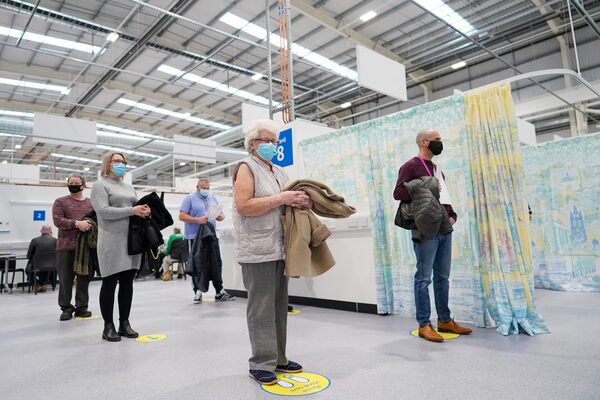
Priority patients wait to receive the AstraZeneca/Oxford University COVID-19 vaccine as they attend the NHS Nightingale North East hospital on Jan. 26, 2021 in Sunderland, England.Ian Forsyth/Getty Images
The European Union plans to exert more control over the export of COVID-19 vaccines as part of a growing row with drug makers that threatens to disrupt vaccination programs in several countries including Canada.
The EU said Tuesday that it’s finalizing a proposal that will require pharmaceutical companies to register their vaccine exports from the bloc. The plan is expected to come into force later this week and it could lead to restrictions on exports.
The move is the latest twist in a dispute between EU officials and AstraZeneca over delays in shipments of the company’s vaccine, which has been developed in conjunction with the University of Oxford. However, any export-control measure would affect vaccine production by Pfizer-BioNTech and Moderna, which also have manufacturing facilities in Europe. Moderna’s vaccine is manufactured outside of the EU but final processing and distribution takes place within the bloc.
All of Canada’s supply of Pfizer-BioNTech and Moderna vaccines comes from the companies’ European sites. Canada has yet to approve the AstraZeneca vaccine, which is made in several locations including Belgium. The federal government has purchased 20 million doses, if it’s authorized by Health Canada, and shipments are expected to start in the second quarter of 2021.
During a press conference on Tuesday, Prime Minister Justin Trudeau batted away any suggestion that the EU threats would affect vaccine shipments to Canada.
Mr. Trudeau said he spoke with executives at Pfizer and Moderna who assured him “that we are very much continuing to be on track for receiving our full doses of vaccines in the timelines provided.”
“It was very, very clear that the Canadian contracts that have been signed and the delivery schedule laid out will be respected,” he added.
Canada has purchased 40 million doses of Moderna’s vaccine, which is made at a facility in Switzerland, according to Paul Monlezun, a spokesperson for Moderna. After initial production in Switzerland, which is not an EU member, the vaccine is bottled and packaged in Spain and shipped to Canada through Belgium.
The 40 million doses that Canada has bought from Pfizer are expected to come from the company’s Belgian plant.
A statement from Pfizer Canada said it’s critical that governments don’t impose export restrictions or other trade barriers on the vaccines. “We look forward to receiving further details on the EU proposal and assessing its impact on patients,” Pfizer spokesperson Christina Antoniou said Tuesday.
The EU’s action highlights the mounting tension over lagging vaccine production. AstraZeneca and Pfizer have both announced production slowdowns in recent weeks, leaving many countries scrambling to meet vaccination targets.
Pfizer said recently that it was remodelling its plant in Belgium in order to nearly double its production to two billion doses this year. The company said the refurbishment would affect some shipments until mid-February, but it added that the allocation of doses to Canada and other countries “will balance out” by the end of March. Canada was hit particularly hard by the slowdown and received no Pfizer doses this week, and is only expecting 79,000 doses next week. Updated numbers for the rest of February have not yet been released.
AstraZeneca’s vaccine is expected to be approved by EU regulators this week and health officials were counting on 80 million doses this quarter. However, last Friday, AstraZeneca said that because of production issues in Europe it would only be able to supply 31 million doses.
That enraged EU officials who have accused AstraZeneca of failing to properly explain the delay. “This new schedule is not acceptable to the European Union,” said Stella Kyriakides, the European Commissioner for Health and Food Safety. The EU “wants to know exactly which doses have been produced by AstraZeneca and where exactly so far and if or to whom they have been delivered.”
The EU and AstraZeneca will hold further talks on Wednesday to try to resolve the issue, but EU officials have made it clear they will be taking a tough line. The new regulations don’t amount to an export ban, but they will force drug makers to provide details about how many doses they manufacture in the EU and where they are shipped.
German Health Minister Jens Spahn wants the EU to go further and restrict exports altogether. “This is not about EU first; this is about Europe’s fair share,” he said.
European Commission President Ursula von der Leyen has also indicated that the EU expects a return for its investment in vaccines. “Europe invested billions to help develop the world’s first COVID-19 vaccines,” Ms. von der Leyen said in a speech at the World Economic Forum on Tuesday. “And now, the companies must deliver. They must honour their obligations.”
Sign up for the Coronavirus Update newsletter to read the day’s essential coronavirus news, features and explainers written by Globe reporters and editors.
 Paul Waldie
Paul Waldie Marieke Walsh
Marieke Walsh